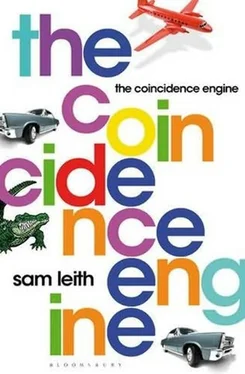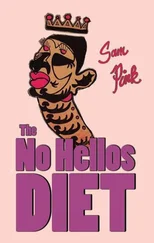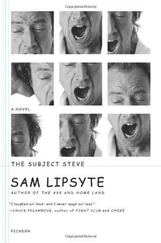
Sam Leith
The Coincidence Engine
© 2011
For Alice, who makes me feel lucky
‘They’ve found the pilot.’
Twelve hundred miles away in New York, Red Queen breathed out.
‘What do we know?’
‘More or less nothing. Hospital sweep sent up flags. Field agents in Atlanta called it in. He’s in Mobile. Name of Arno Fisk. I’m headed over there now to talk to him.’
‘Condition?’
‘Cuts and bruises. Some – well. They’re saying some cognitive issues.’
In the background, Red Queen could hear wind across the mouthpiece of the phone. Behind that, the sound of heavy traffic moving fast: trucks pounding south on the interstate.
‘It’s not clear. He was dressed as a pilot, but he’s not a pilot. There’s nothing on him in the FAA database. He was unconscious for some time. What I hear -’
The wind picked up and the next few words were inaudible.
‘- consciousness. I need to go.’
‘OK, go,’ said Red Queen.
The phone went down in its cradle.
Red Queen’s desk was broad and made of dark wood. The top was covered in red leather. It was out of place. It belonged among other antiques – not in this oblong box with its ozonic air conditioning and its twenty-four-hour fake sunlight. There were no books in the room. An uncomfortable two-seat sofa, against the wall, faced the desk. On the other wall there was a locked cabinet. There were no windows.
A corner of the leather surface of the desk looked like it had been chewed by mice. Red Queen picked at the leather with a fingernail for a moment, staring at nothing.
Then Red Queen turned to the computer, waggled the mouse to bring the screen alive, and brought up the Intercept to read it again.
Bree, on the highway, hung up the phone on the timber wall of the Snacky Shack and walked round to the door. It was late morning and the sun, already hot, bounced off the dusty glass and winked at her. She’d been driving for three hours already. Red Queen could wait half an hour while Bree got waffles.
Bree was the only person in the place – an awkward L-shape that had once been a barn, or an auto-shop or something. Formica tables, pairs and fours. Booths lined the window onto the highway and Bree sat in the furthest one of those, with her back to the corner wall. She sat a while, watched the traffic tick past, waited while the waitress finished scratching in her hair with her pencil.
The waitress leaned down by the chef – a good-looking Latino wearing a greasy checkered dishcloth as a bandana – and produced a laminated menu the size of an occasional table. She dropped it wordlessly in front of Bree, left, returned with a clear plastic beaker of iced water, set that wordlessly down, fished a pad from her pouch and pointed at it, expectantly, with her head-scratcher.
‘Morning,’ said Bree.
‘Mornin’ ’ said the waitress.
‘Belgian waffles,’ she said. ‘Three eggs over medium, Canadian bacon, chicken sausage and sourdough toast; two rounds.’
The waitress wrote it down.
‘You want a side of fries with that?’
Bree’s eyes flicked up from the menu.
‘No fries,’ she said. ‘And no grits.’
The waitress looked at her. Bree looked back.
‘Thank you,’ said Bree, and smiled sweetly.
Thirty minutes later Bree was back heading south in the brown Chrysler with the windows up and the air conditioning on, and by mid-afternoon, she was rolling into Mobile. She left the interstate and took Airport Boulevard.
Providence Hospital was a white building west of the centre of town. Bree drove in under a quaint old archway, swung the front of the car round and parked up under a shade tree, just out of the sightline from the main entrance.
She got out and the weather hit her. It was as if the humidity had tugged the leash on her breath. She’d worked up just enough of a sweat for it to chill on her, unpleasantly, when she stepped into the air-conditioned lobby. She ignored the potted palms and crossed to the desk.
‘Visiting Fisk, room 325,’ she said. ‘Helen Fisk. I called earlier.’
She showed the woman her ID. The woman didn’t seem interested. Bree wrote ‘Helen Fisk’ in the register, went to the elevator and went up.
It was a nice hospital. Someone cleaned it. Her flats didn’t stick. She’d been in hospitals where only people in heels – and Bree hadn’t worn heels since she could remember – were really qualified to make it down the corridors.
The room that the man who seemed to be called Fisk was supposed to be occupying was down a long corridor and through some doors. Bree had a pretty good sense of direction. West, it should be facing, over scrubland and away from the parking lot and the main part of the hospital. She listened at the door a little, then when she was satisfied nobody was in Fisk’s room, knocked softly.
She didn’t wait for an answer, but opened the door, slipped in, closed it behind her.
The room did face west. The blind was half lowered, and afternoon light came through the bottom half of the window and slanted across the foot of Arno Fisk’s bed.
Fisk was awake but he looked a little glassy. He had dark hair, spilling from a bandage wrapped round the top of his head, and a purple, very shiny bruise bulbing out the right side of his forehead and casing the orbit of his eye. Underneath his right eye the skin was wasp-striped black and yellow.
There was something dark – looked like dried blood – in his nostrils, and a single butterfly stitch on his lip. He was a mess. Bree couldn’t see what was going on under the blanket, but both the arms above it – resting side by side on the tray table over his waist and looking uncomfortable – were in casts to the elbow.
She’d been in the room for a couple of seconds before his eyes rolled towards her, as if in surprise, and focused a foot or two behind her left shoulder. They were shiny, and such a dark brown that the pupils and the irises, at this distance, were hard to tell one from the other. Even smashed up, he was a handsome man, though more tanned than Bree thought was ideal.
‘Come in,’ he said. It came out: ‘Cerrm urh?’ Then he looked surprised again.
Bree walked up to the bed. She didn’t bother affecting hesitation. According to the medical notes the agents in Atlanta had skimmed, there had been no permanent brain damage or intra-cranial bleeding. Just a prize-winning compendium of fractures, breaks and abrasions – consistent, one of Bree’s colleagues had said, with the rough prognosis for an eight-year-old child with rickets spending a half-hour in an industrial tumble dryer.
This spaciness was probably just drugs. If they had him self-administering he’d be no use to Bree, or anyone.
‘Mr Fisk,’ Bree said.
His eyes said, ‘Who wants to know?’ and his mouth said, ‘Urr?’
‘Mr Fisk, my name is Dana Hamilton. I’m from the Federal Aviation Authority.’
She reached into her top pocket and showed him Dana Hamilton’s business card. He frowned at her wrist. Closer up, she could see where his pupils ended and where his irises began. His irises were fingernail-thin, chocolate-coloured haloes. He looked like a badly mangled bushbaby.
‘Federr avuh urrdurr?’
‘Yes, Mr Fisk. And may I say what a pleasure it is to meet you today?’ Dana extended her hand. There were four fingers extending from the cast on his right arm. Dana shook two of them.
There was a chair by the bed. She pulled it round and sat on it.
‘I’ve come to talk to you about your accident. I work as an insurance assessor for our pilot outreach branch, unexpected eventuality division.’
Читать дальше













